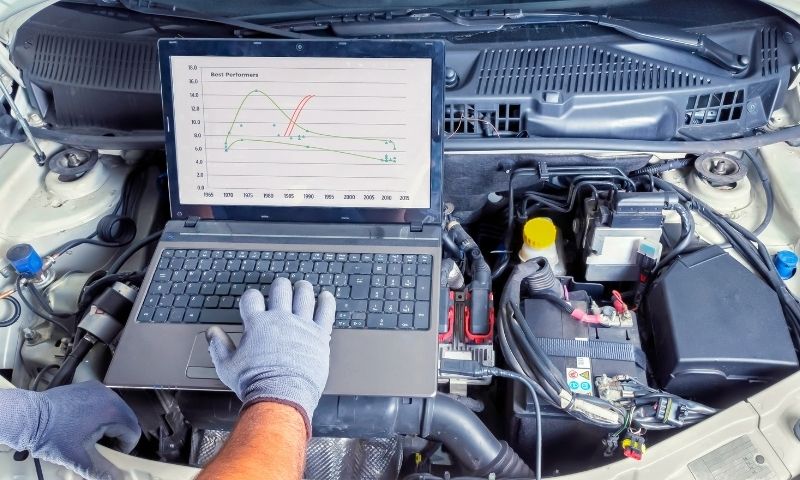A Leading Resource Built By Automotive Lovers, For Automotive Lovers.
We’ve helped consumers around the world make their purchasing decisions.
Latest Articles
Electric bike batteries, mainly lithium-ion, last about 3 to 5 years or 500 to 1,000 charge cycles. Their lifespan depends on battery quality, charging habits, and usage patterns. Good maintenance… The iPad battery typically lasts 2 to 3 years or about 1000 charge cycles, retaining around 80% of its capacity. Users can expect 4 to 10 hours of use per… An e-bike battery usually lasts 2 to 10 years. Lifespan depends on usage patterns, charging habits, and battery quality. Most lithium-ion batteries endure 500 to 1,000 charge cycles before their… The lifespan of a UPS battery usually ranges from 3 to 5 years for sealed lead-acid batteries and can be up to 10 years for lithium-ion batteries. Factors like operational… Solar batteries usually last between 5 to 15 years. Proper care and normal temperatures can help them last longer. Lithium-ion batteries, the most common type, generally have an expected lifespan… A Ryobi battery usually lasts 3 to 5 years, depending on use and care. These lithium batteries can hold a charge for months. To improve battery performance, charge regularly and… The Toyota Prius battery usually lasts 8 to 10 years, or about 100,000 to 150,000 miles. Some batteries can reach over 200,000 miles with proper care. Driving more can extend… Hybrid batteries typically last 100,000 to 200,000 miles or 8 to 10 years. Most vehicle manufacturers offer warranty coverage for these batteries, usually for 8 years or 100,000 miles. Longevity… A lithium-ion battery typically lasts 2 to 10 years, or 300 to 1,000 charge cycles. Lifespan depends on usage patterns and environmental conditions. Lithium Iron Phosphate (LiFePO4) batteries can have… Dyson batteries usually last 4 to 5 years based on usage and maintenance. Higher frequency of use can shorten their lifespan, while good care can help them last longer. For… The average lifespan of a car battery is 3 to 5 years. Factors like climate, driving habits, and battery type influence longevity. Lead-acid batteries last 3-5 years, AGM batteries 4-7… The lifespan of a deep cycle battery generally lasts 3 to 6 years. Key factors include battery type, usage, maintenance, and climate. Lead-acid, lithium, and gel batteries have different lifespans…. The latest battery technologies are solid-state, lithium-sulfur, sodium-ion, and graphene batteries. These innovations provide higher energy density and faster charging. QuantumScape and Ryden dual carbon technology are at the forefront… The largest lithium-ion battery is the Moss Landing Energy Storage Facility. It has a capacity of 750 MW and stores 3,000 MWh of energy. The facility underwent expansions to strengthen… The internal resistance of a 12V battery shows how easily current flows through it. New 12V batteries usually measure between 0.011 and 0.016 ohms. Older batteries can exceed 0.025 ohms…. The internal resistance of a lead-acid battery is usually between a few hundred milliohms (mΩ) and a few thousand mΩ. This resistance changes with load current and impacts battery performance…. An electric vehicle’s high-voltage battery comprises battery cells, battery modules, and a traction battery pack. These components usually include lithium-ion batteries, known for their high energy density. The battery management… The Moss Landing Energy Storage Facility is the highest capacity battery system, with 750 MW / 3,000 MWh. The Panasonic NCR18650G has the highest capacity for 18650 cells at 3600… The highest phone battery capacity is 28,000mAh, found in the Energizer Hard Case P28K. This rugged phone has an IP69 rating, offers 94 days of standby time, and 5 days… High-voltage batteries have the highest battery voltage, starting at 300 volts and reaching over 800 volts. Lithium batteries can reach 4.2 volts per cell, and lead-acid batteries provide good energy… The Galaxy Note 8 has a battery capacity of 3300mAh. This lithium-ion battery supports fast charging. Users can enjoy up to 30 hours of talk time and up to 3… A battery serves as the primary energy source in a circuit. It supplies voltage, enabling current flow. Batteries change chemical potential energy into electrical energy. They push electrons through conductive… The future of battery technology includes solid-state lithium batteries with higher energy density. Alternatives like lithium-sulfur and lithium-oxygen batteries are also promising. Advances in recycling and government funding can improve… A potato serves as the electrolyte in a potato battery. It contains phosphoric acid and ions, which help conduct electricity. The potato connects zinc and copper electrodes, allowing electrons to… Tesla’s 4680 batteries have an energy density of 244 to 296 Wh/kg. The Model Y cell has an energy density of 244 Wh/kg, and the Model 3 battery offers around… The efficiency of lithium-ion batteries typically exceeds 80%, with less than 20% energy loss. They can reach up to 99% efficiency during slow charging. Discharge efficiency ranges from 95% to… Kia provides an industry-leading EV battery warranty of 8 years or 100,000 miles. This warranty covers the Lithium-Ion Polymer Battery. Generally, Kia EV batteries can last 10 to 15 years,… The depth of discharge (DoD) for lithium-ion batteries usually ranges from 20% to 100%. The DoD percentage indicates how much energy has been used compared to the total battery capacity…. AGM batteries differ from standard (flooded lead-acid) batteries in several ways. AGM batteries have lower self-discharge and superior charge retention. They require less maintenance because they are sealed. Additionally, AGM… A lithium-ion battery produces energy through a chemical reaction. Lithium ions shift from the anode to the cathode. At the anode, lithium undergoes oxidation to become Li+. This movement creates…Electric Bike Battery Lifespan: Key Factors and Tips to Prolong Its Lifetime
iPad Battery Lifespan: Factors Influencing Average Duration and Performance
E-Bike Battery Lifespan: How Long Do Electric Bike Batteries Last and Best Practices
UPS Battery Lifespan: Key Signs for Replacement and Understanding Average Life
Solar Battery Lifespan: Factors Affecting Duration and Life Expectancy
Ryobi Battery Lifespan: Key Facts on Longevity, Performance, and Usage
Prius Battery Lifespan: Average Life, Key Factors, and Cost Explained
Hybrid Battery Lifespan: Key Insights on Duration, Longevity, and Replacement Costs
Lithium Battery Lifespan: Duration, Longevity, and Prolonging Tips Explained
Dyson Battery Lifespan: Key Insights on Battery Life, Care, and Replacement Tips
Battery Lifespan: How Long Do Car and Electric Car Batteries Last?
Deep Cycle Battery Lifespan: Maintenance Tips to Extend Duration and Longevity
Latest Battery Technology: Discover Innovations and Breakthroughs Shaping the Future
Largest Lithium Ion Battery: Explore Energy Storage and Battery Sizes
Internal Resistance of a 12V Battery: Performance, Testing, and Capacity Insights
Internal Resistance of a Lead Acid Battery: Key Factors and Performance Insights
High-Voltage Battery in EVs: Key Components, Composition, and Safety Explained
Highest Capacity Battery: Top Lithium-Ion and 18650 Options Explored
Highest Phone Battery Capacity: Explore the Longest Lasting Smartphones with Best mAh Ratings
What is the Highest Battery Voltage? Types, Safety, and Voltage Charts Explained
Galaxy Note 8 Battery Capacity: Specs, Performance Insights, and User Experience
Battery Function in a Circuit: Role, Importance, and How It Powers Electricity
The Future of Battery Technology: Innovations and Trends Shaping Energy Storage
Potato Battery: What Is the Electrolyte and Its Role in Electrical Energy?
Tesla Battery Energy Density: Specifications, Performance, and 4680 Improvements
Lithium-Ion Battery Efficiency: Key Factors, Performance Metrics, and Comparisons
Kia EV Battery Warranty Duration: Coverage, Protection, and Key Details Explained
Depth of Discharge for Lithium Ion Batteries: Importance, Impact, and Battery Life Explained
AGM vs. Standard Battery: Key Differences, Advantages, and Which Is Better for You
Lithium-Ion Battery: What is the Chemical Reaction and How It Works



